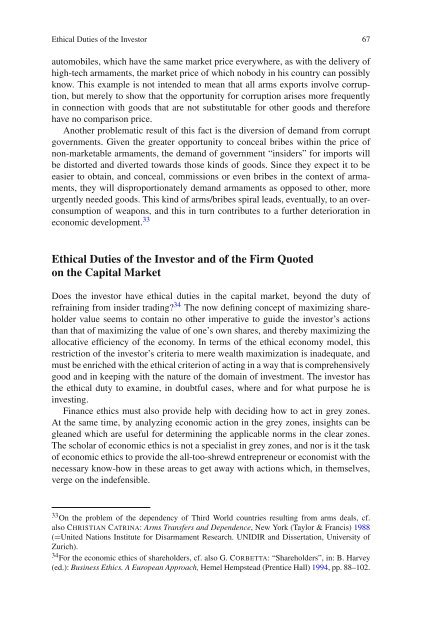The Ethics of Banking: Conclusions from the Financial Crisis (Issues ...
The Ethics of Banking: Conclusions from the Financial Crisis (Issues ...
The Ethics of Banking: Conclusions from the Financial Crisis (Issues ...
You also want an ePaper? Increase the reach of your titles
YUMPU automatically turns print PDFs into web optimized ePapers that Google loves.
Ethical Duties <strong>of</strong> <strong>the</strong> Investor 67<br />
automobiles, which have <strong>the</strong> same market price everywhere, as with <strong>the</strong> delivery <strong>of</strong><br />
high-tech armaments, <strong>the</strong> market price <strong>of</strong> which nobody in his country can possibly<br />
know. This example is not intended to mean that all arms exports involve corruption,<br />
but merely to show that <strong>the</strong> opportunity for corruption arises more frequently<br />
in connection with goods that are not substitutable for o<strong>the</strong>r goods and <strong>the</strong>refore<br />
have no comparison price.<br />
Ano<strong>the</strong>r problematic result <strong>of</strong> this fact is <strong>the</strong> diversion <strong>of</strong> demand <strong>from</strong> corrupt<br />
governments. Given <strong>the</strong> greater opportunity to conceal bribes within <strong>the</strong> price <strong>of</strong><br />
non-marketable armaments, <strong>the</strong> demand <strong>of</strong> government “insiders” for imports will<br />
be distorted and diverted towards those kinds <strong>of</strong> goods. Since <strong>the</strong>y expect it to be<br />
easier to obtain, and conceal, commissions or even bribes in <strong>the</strong> context <strong>of</strong> armaments,<br />
<strong>the</strong>y will disproportionately demand armaments as opposed to o<strong>the</strong>r, more<br />
urgently needed goods. This kind <strong>of</strong> arms/bribes spiral leads, eventually, to an overconsumption<br />
<strong>of</strong> weapons, and this in turn contributes to a fur<strong>the</strong>r deterioration in<br />
economic development. 33<br />
Ethical Duties <strong>of</strong> <strong>the</strong> Investor and <strong>of</strong> <strong>the</strong> Firm Quoted<br />
on <strong>the</strong> Capital Market<br />
Does <strong>the</strong> investor have ethical duties in <strong>the</strong> capital market, beyond <strong>the</strong> duty <strong>of</strong><br />
refraining <strong>from</strong> insider trading? 34 <strong>The</strong> now defining concept <strong>of</strong> maximizing shareholder<br />
value seems to contain no o<strong>the</strong>r imperative to guide <strong>the</strong> investor’s actions<br />
than that <strong>of</strong> maximizing <strong>the</strong> value <strong>of</strong> one’s own shares, and <strong>the</strong>reby maximizing <strong>the</strong><br />
allocative efficiency <strong>of</strong> <strong>the</strong> economy. In terms <strong>of</strong> <strong>the</strong> ethical economy model, this<br />
restriction <strong>of</strong> <strong>the</strong> investor’s criteria to mere wealth maximization is inadequate, and<br />
must be enriched with <strong>the</strong> ethical criterion <strong>of</strong> acting in a way that is comprehensively<br />
good and in keeping with <strong>the</strong> nature <strong>of</strong> <strong>the</strong> domain <strong>of</strong> investment. <strong>The</strong> investor has<br />
<strong>the</strong> ethical duty to examine, in doubtful cases, where and for what purpose he is<br />
investing.<br />
Finance ethics must also provide help with deciding how to act in grey zones.<br />
At <strong>the</strong> same time, by analyzing economic action in <strong>the</strong> grey zones, insights can be<br />
gleaned which are useful for determining <strong>the</strong> applicable norms in <strong>the</strong> clear zones.<br />
<strong>The</strong> scholar <strong>of</strong> economic ethics is not a specialist in grey zones, and nor is it <strong>the</strong> task<br />
<strong>of</strong> economic ethics to provide <strong>the</strong> all-too-shrewd entrepreneur or economist with <strong>the</strong><br />
necessary know-how in <strong>the</strong>se areas to get away with actions which, in <strong>the</strong>mselves,<br />
verge on <strong>the</strong> indefensible.<br />
33 On <strong>the</strong> problem <strong>of</strong> <strong>the</strong> dependency <strong>of</strong> Third World countries resulting <strong>from</strong> arms deals, cf.<br />
also CHRISTIAN CATRINA: Arms Transfers and Dependence, New York (Taylor & Francis) 1988<br />
(=United Nations Institute for Disarmament Research. UNIDIR and Dissertation, University <strong>of</strong><br />
Zurich).<br />
34 For <strong>the</strong> economic ethics <strong>of</strong> shareholders, cf. also G. CORBETTA: “Shareholders”, in: B. Harvey<br />
(ed.): Business <strong>Ethics</strong>. A European Approach, Hemel Hempstead (Prentice Hall) 1994, pp. 88–102.

















